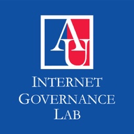What would it look like if Russian election interference attempts had focused on the Internet of Things instead of social media? This is just one of the questions posed by Internet Governance Lab Faculty Director Laura DeNardis who is speaking again at Columbia SIPA’s Digital Futures Policy Forum.
This year Dr DeNardis is participating in the Global Governance and Cyber Conflict panel, focusing on how conflict in cyberspace is being affected by radically changing societal dependence on the insecure networks and systems used by Internet of Things devices.
DeNardis explores how we are now moving into Cyber Conflict 2.0 , a shift where cyber-physical conflict exploits IoT as a proxy for political power. Coupled with the absence of consistent international laws relating to cyberspace, this means that cyber attacks pose a real threat to national security, self-governance and democracy. Attacks that just a few years ago could have been ignored or circumvented could now prevent a country from functioning.
As she discusses in her upcoming book, The Internet in Everything: Freedom and Security in a World with No Off Switch, DeNardis shows that it’s no longer necessary to try and hack into voter rolls or use social media campaigns to influence elections. Instead she asks us to consider a world in which people might be prevented from voting by hackers targeting voters in specific areas through creating gridlock via smart city traffic systems or falsely setting of home alarm systems,as disruption becomes a means of voter suppression.
Along with her co-presenters, Jason Healey (Senior Research Scholar, Columbia SIPA), Angela McKay (Senior Director, Cybersecurity Policy and Strategy, Microsoft) and Greg Rattray (Director, Global Cyber Partnerships & Government Strategy, JPMorgan Chase), DeNardis considers the collection action which needs to be taken as the private sector becomes enmeshed in cyber conflicts and what their priorities need to be.
Watch the full Global Governance and Cyber Conflict panel below:
Watch DeNardis’s closing remarks, wrapping up key conference themes:

